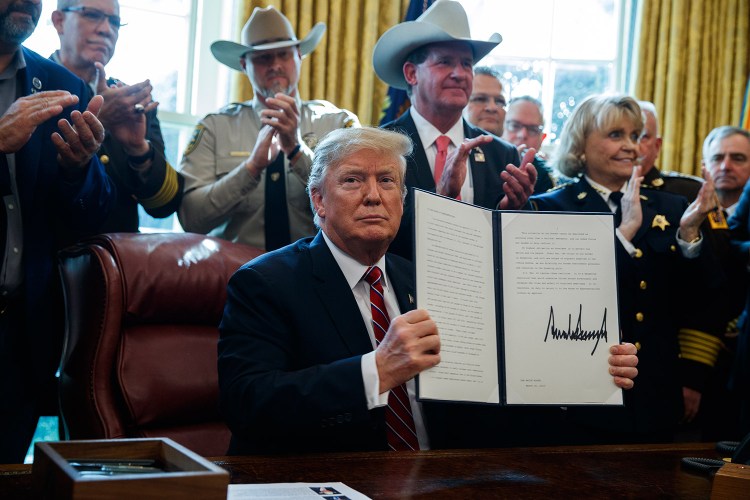WASHINGTON — President Trump’s declaration of a national emergency at the U.S.-Mexico border survived a critical vote in the House on Tuesday, as Democrats failed to muster the necessary two-thirds majority to override his veto.
The vote was 248-181, well short of the 288 that would have been required. The vote effectively ends – for now – legislative attempts to strike down Trump’s national emergency declaration. Now the fight over his attempt to circumvent Congress to get more money for his border wall will shift to the courts.
Both of Maine’s representatives, Chellie Pingree of the 1st District and Jared Golden of the 2nd District, voted in favor of overriding the veto.
“President Trump can’t take taxpayer dollars to build his wall without Congress’s permission,” California Attorney General Xavier Becerra, a former congressman who has filed a lawsuit to block Trump’s declaration, said following the vote. “The 20 states standing with us in court are ready to fight long and hard to stop his fabricated emergency in its tracks.”
Congress sent Trump a bipartisan disapproval resolution earlier this month that sought to nullify his national emergency declaration, but Trump used the first veto of his presidency to strike it down. Trump had announced the national emergency in February, following a record-long government shutdown and weeks of negotiations that resulted in a deal giving him billions less than he sought for barriers along the border.
Lawmakers of both parties said the emergency declaration – which allows Trump to redirect money Congress appropriated for other purposes and use it for border construction instead – represented a dramatic intrusion into Congress’ authority over government spending.
In floor debate ahead of the vote Tuesday, Democrats insisted Trump was violating the Constitution’s separation of powers, while Republicans argued he was acting within his authority under the National Emergencies Act to address a genuine crisis at the southern border.
“What we have here is an act of constitutional vandalism – the executive trying to steal the power of the purse from Congress,” said Rep. Joaquin Castro, D-Texas. He warned that if lawmakers allow it to happen, future presidents of both parties will have great power to ignore Congress.
Fourteen Republicans broke ranks to vote with Democrats in attempting to overturn Trump’s veto, but they represented a small minority as most GOP lawmakers stood with the president, arguing he was addressing an emergency Democrats had ignored.
“The radical left in this House would dissolve our borders entirely if given the chance,” declared Rep. Tom McClintock, R-Calif. “They care more about defending the Iraqi border than defending our own.”
Border apprehensions have spiked and are on pace for the highest level since 2008, although they remain below peak rates in the 1990s and early 2000s. Lawmakers of both parties generally agree that there is an unfolding humanitarian crisis at the border, with many families from Central America attempting to enter the U.S., but Democrats argue that a wall won’t help with that.
Republicans disagree, and Trump has continually argued that a wall – the central issue he campaigned on – is needed to stop illegal immigration and drugs. Trump long claimed Mexico would pay for the wall, but the national emergency declaration allows him to take $3.6 billion appropriated by Congress for military construction projects nationwide and use it to build barriers along the border instead.
The Pentagon still has not told lawmakers which military construction projects will be canceled or delayed in the process, frustrating lawmakers of both parties.
It is rare for Congress to successfully override a presidential veto, something that happened only once during the Obama administration, and Tuesday’s outcome was expected. Because the veto override vote failed in the House, it will not go to the Senate – sparing senators from having to take another vote on an issue that deeply divided Republicans in the chamber.
However, the National Emergencies Act does allow Democrats to bring up another disapproval resolution six months from now, something House Democrats are actively considering. Democrats are also considering trying to include language in upcoming spending bills to restrict the Trump administration’s ability to redirect money towards border construction going forward.
At least seven lawsuits have been filed in federal courts challenging the legality of Trump’s emergency declaration and his plans to spend funds on the wall that have not been appropriated by Congress for that purpose. The government has yet to reply to them and no hearings have been scheduled.
The plaintiffs in the suits, filed in U.S. district courts in California, Texas and the District of Columbia include California and 18 other states, the city of El Paso, land owners in the path of the proposed wall, conservation groups such as the Sierra Club and the Center for Biological Diversity and advocacy organizations, including the American Civil Liberties Union and Citizens for Responsibility and Ethics in Washington (CREW.)
The Washington Post’s Fred Barbash and Maria Sacchetti contributed to this report.
Send questions/comments to the editors.


